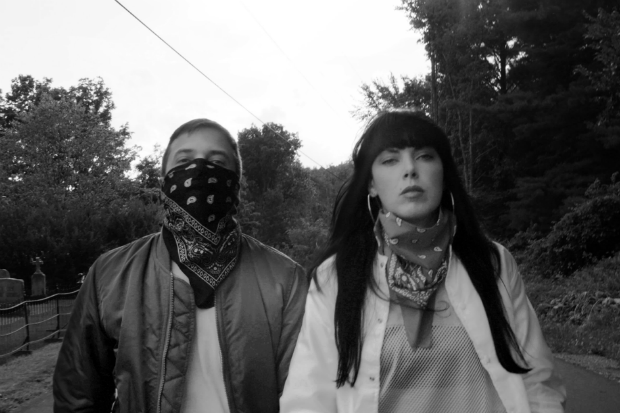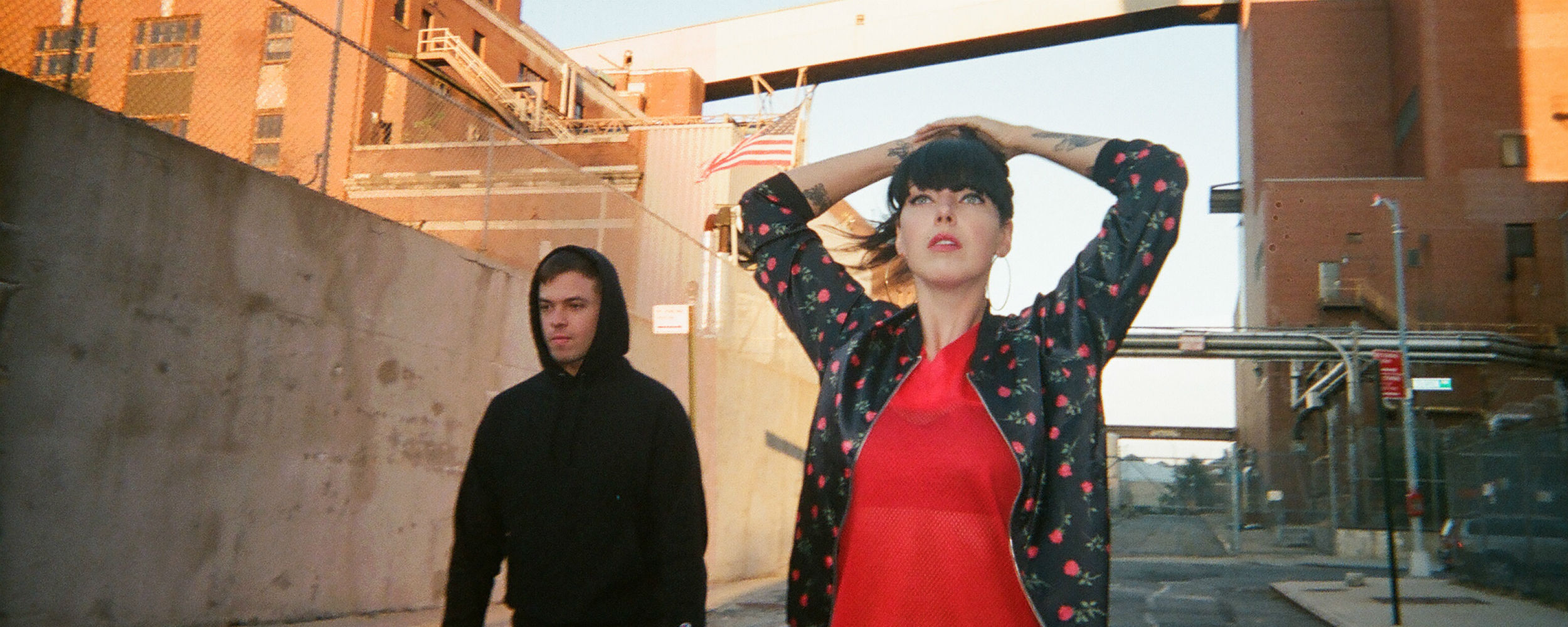Derek Miller is his own worst critic. There’s a genuine intensity to the 35-year-old guitarist and producer—who makes up one half of the frenetic noise-pop duo Sleigh Bells—as he evaluates his band’s work. When we met, he sat hunched over in the living room of his one-bedroom apartment in Williamsburg, Brooklyn, as though the pressure of self-analysis was literally weighing on him. He doesn’t just evaluate Sleigh Bells’ newest album, the willfully difficult Jessica Rabbit, in context of the band’s previous work, but against the accomplishments of music’s all-time greats, like the Jackson 5 and Public Enemy. The comparison might seem ballsy, but it’s rooted in admiration and humility.
“It’s by far the most difficult thing to do,” Miller says of songwriting. “To come up with three to three-and-a-half minutes of really intoxicating music, really exhilarating music, is damn hard.”
That might explain what took Sleigh Bells so long to finish their recently released fourth album, their first in three years. The inaugural outing from the pair’s very own Torn Clean record label, Jessica Rabbit was put together in a series of fits and starts that date back to when the band was still touring for their third full-length, 2013’s Bitter Rivals. Pausing from autographing a stack of promotional posters, Miller and his bandmate, 31-year-old vocalist Alexis Krauss, are frank when discussing the 14-track set. They both know they’ve made a fussy, dizzying record that’s inviting at some points and quite alienating at others.
But bluntness has always been key to Sleigh Bells’ aesthetic: Their 2010 debut album, Treats, stuck out for its pulverizing riffs, compressed production, and punishing volume—they made jock jams for art-school kids. Reign of Terror, released in 2012, drew on ’80s arena metal and personal tragedy (writing the album helped Miller process the loss of his father, who died in 2009). One year later, they dropped Bitter Rivals, which was met with a decidedly mixed reception, compared to its predecessors—its Metacritic score stands at 70, below Treats‘ 84 and Reign of Terror‘s 77.
In the three years since, they’ve shared some one-off tracks, moved on from onetime label Mom+Pop, and founded Torn Clean. They’ve also expanded the parameters of their sound: Seeking guidance from executive producer Mike Elizondo (who has previously worked with Eminem and Fiona Apple), Sleigh Bells began experimenting with synths and cello, relying less on the guitars that first distinguished them. Elements of pop and R&B had been part of the band’s makeup in the past—particularly on Bitter Rivals—but now, as Krauss has become more involved with the songwriting and comfortable testing the range of her voice, those sorts of melodies have become especially prominent.
The result is Jessica Rabbit, a hyperactive and restless collection of songs. Tempos change often and without much warning. Short, interlude-type tracks offer some breathing room, but the pace is pretty relentless throughout. This record features some of Sleigh Bells’ most satisfying music to date, and some of their most abrasive—usually in the same song, as in the case of two-headed advance cut “Rule Number One.”
We talked to Sleigh Bells about the three-year process of assembling Jessica Rabbit, the dynamics behind their partnership, and where they’re headed next.
Starting with the end of the Bitter Rivals era, how were you feeling after that tour? I imagine you must’ve been exhausted, with the pace that you were releasing music.
Miller: No, I was excited. Creatively, I knew that there was a lot of space to cover, and I still feel that way. I sort of failed in the respect that I promised myself that we wouldn’t put the new record out until I was convinced that it was great, and I don’t think it’s a great record, by my standards. I’m judging it against my favorite records—how does it stand up against [Public Enemy’s] Nation of Millions? It doesn’t, for me. I’m sure for some of our fans, there’s somebody out there for whom it’ll be their favorite record, but I promised myself that I would work until it felt that good to me. I’m not talking about cultural impact or anything like that, because I don’t aspire to any of that—for me it’s mostly what comes out of the speakers, which is very old-fashioned.
Krauss: [To Miller] You’ll never get there, though.
Miller: That’s how I felt, and that’s why it took so long. We just kept writing, and writing, and writing, and recording, and eventually I just had to realize that I was going to drive myself crazy and probably jump off the roof if we didn’t just call it, collect 40 to 50 minutes of music together, and then just start on the fifth record.
What are the shortcomings you hear on Jessica Rabbit?
Miller: I don’t even want to get into it. I just feel that, for me, it’s an uneven record. I could tear it to shreds, but when it’s on, it feels really good to me. There are five or six tracks on it that I love, that I believe—and I hope this doesn’t sound obnoxious—are very, very good. I don’t know if there’s anything on it that’s capital-G Great, but we may never get there, for me, and I guess I just have to live with that. But, I mean, the Jackson 5 were capital-G great, these are gigantic behemoths [that I’m talking about].
Krauss: Just to go back to your initial question, the only time I ever felt really fatigued by touring was the end of our first album cycle, because it was new to us in this context and we probably said yes to too many things. But now that we’ve found our balance—especially with what we can handle live, how many shows we can play—it’s my favorite thing to do. So, coming off of Bitter Rivals didn’t feel like, “Holy fuck, I’m going to kill him, I’m going to kill the crew, get me off this bus.” I missed it.
Miller: I missed it, too. Sleigh Bells is definitely a family affair. It’s not just business. It’s work, we’ve had some of our crew change and whatnot, but for the most part we’ve been with the same people since Reign of Terror, and we care about each other. That helps a lot. It’s the same with Alexis and I, it’s an actual friendship. So when you regard the other person and you’re not forced to meet up with them to write songs because you need a publishing deal, then it becomes a totally different thing. It’s something that is essential in my life because it makes me happy.
Alexis, do you nitpick over the new record in the same way that Derek does?
Krauss: I do, but not to the same degree. He’s much more critical of every aspect of everything than I am. I think it’s also because it’s born from him, and even though our collaborative process has grown and it’s much more equal than it ever has been, we’re different personalities. [Our new] poster—“The Penalty for Failure is Death”—embodies Derek. I understand and relate to that, I’ve definitely felt like that at times, but Derek is heavier than I am in a lot of ways.
Miller: I’m a lot darker as well.
Krauss: That’s why we work well together—we balance each other out. That’s not to say that I haven’t felt very much, with this record and this entire process, like there was more at stake for us. It’s felt more serious and I’ve felt much more invested in it. And I have been very confused at times by my own personal reactions to the music because it’s very manic and unpredictable. I’ll have moments with this album where I just love it to death, it brings me to tears, I’m so shocked that we created something like this—and then I have moments where it feels like I’m hearing the music differently and it’s making me extremely uncomfortable and I hate it. I can’t really describe, it’s a very day-to-day thing.
Miller: I’m prone to darkness, without question. I’m not talking about being a scumbag or a bad guy, I’m just talking about waking up with a black cloud over your bed, and then reading the front page of the Times, and, I’ll say it again, wanting to jump off the fucking roof. I think we all know why—did we watch any of the debates? Everything feels consequential. I’m kind of an asshole in that respect: It’s always the end of the world. I’m a dramatic guy. It’s not like I’m going to wake up and everything’s going to be fine if I can’t do the type of work that I want to do. It feels like life will end. So, that makes for really, really, really good days and really bad days, and I feel that the poles get pushed farther and farther apart as I’m aging. The natural high is incredibly high, and then the low is equally as terrible.
 I think that they’ve always been high. If you’re in the music industry in 2016 and you’re not worried about your job, you should be—unless you’re Drake.
I think that they’ve always been high. If you’re in the music industry in 2016 and you’re not worried about your job, you should be—unless you’re Drake.
Krauss: Because I was using my voice differently, because I was more involved in the writing process—I definitely felt a pressure. I felt like I was sharing a new part of myself on this album, and Derek, too. I think the instrumentation and production is very different than what we’ve heard in the past, but I felt particularly vulnerable putting this part of myself out there because I know it sounds dramatically different from maybe what a fan of Treats heard and wants. That’s coming from my own insecurity of wanting it to be good and wanting people to like it. But I’m also, as a result of that, just more excited about it.
In the midst of this long break between records, were you worried that the musical landscape had moved on without you?
Miller: Of course, you’re always worried about that. The tour that we’re in the middle of right now, we’re basically just testing that out: “Is anybody going to come to these shows?” And they did. That was heartening because you never know.
Krauss: On this past tour, to see fans who did come to shows for Treats … We have that loyalty, which is incredible, but then we also have people who listened to our band when they were 15, and now they’re in a completely different place in our lives. Of course you have to wonder, “Who is going to support Jessica Rabbit?” My nerves were calmed by this last tour, because I felt like, “Wow, people do care, and they still care.” People are living very distracted lives these days, but, to a certain degree, we’ve managed to stay a part of them.
Because you worked so obsessively on Jessica Rabbit and the songs are so all over the place, how did you know when a track was done? Was there a point where you just realized you had stuffed too many tempo changes in there and had to scale it back?
Miller: Usually, you know when it’s done when you can get through an entire listen without stopping it. I think [Drake’s producer, Noah “40” Shebib] said that as well. It’s usually pretty obvious, though: If there’s a question as to whether or not it’s finished, then it’s not finished.
Krauss: Because we had more time making this album, there was a lot more space. We could listen to something obsessively, which is what we tend to do when we first record something—we’re just completely obsessed with it, and you have blinders on, like when you’re falling in love. Then you start to realize that there are cracks and holes and things that need work.
Miller: But over the course of a year and half, every time you open the session you just tweak it a little more and keep working on it. That was new, and I should have done it with Bitter Rivals. I think, two or three of the songs on that record I really dislike, but some of the material is really strong. I think putting that record out so quickly on top of the other two, and probably sounding a little smug about that, which was not my intention … You know, “We wrote three records in four years,” that’s my fault. I was just excited. It’s more like, “Can you believe it?!” Not like, “Look what we did, look how great we are.” It was just enthusiasm that gets misinterpreted.
Do you think people actually felt that way? That you were smug about being prolific?
Miller: I just felt that way about it. That’s my interpretation of how I came off. When I think about if I was reading it, I would’ve been like, “This fucking asshole.” I tend to be a very brutal critic. I can be generous as well, and when I love something, my God, there’s nothing I won’t say to you to get you to listen to it. [Bitter Rivals] would have benefitted greatly from spending more time on it. I realized once we finished it, even a few months after, that it was a mistake to work on it so quickly, to record it so quickly and not to sit on any of the material. A lot of that stuff was written, recorded, and finished within, like, a week. Some of those songs were done on-the-spot, and I thought that the energy, momentum, and spontaneity of the moment would somehow make it onto the record. But now that sounds to me, only on some of the material, like it just suffered because of it. If I had spent another month with it, I’d listen to how I would’ve treated it now and, yeah, it’s a little depressing because it is what it is. It’s done. That was a lesson that we learned and another reason why we decided to take more time with this one.
Derek Miller: “Whether we’re in a stadium or playing a fucking dive, I’m going to be doing Sleigh Bells.”
I really liked that record when it came out. Listening to it now—I still enjoy it on the whole—but tracks like “Sing Like a Wire,” it seems like you guys were really burning through stuff.
Miller: That’s actually one of the ones I’d love to get back, because it still has a lot of potential to me. And especially “24” [is] so strong to me and it could have been so, so much better. I just know the decisions I would have made from a production standpoint would just flatter what’s there so much more. I was trying to fit so much through the speakers, and I think it just hurt it. It’s a song that has a lot of really great ideas, and I’m sure some people are like, “No, it’s perfect, fuck it,” but these are just my ideas.
Alexis, you mentioned using your voice differently on this record. What are you referring to specifically?
Krauss: It’s mixed differently, from an engineering perspective. I’m most attracted to vocalists who sound like they’re on the brink of collapse, like their voice is going to give out on them. I love vocalists who are able to make you feel triumphant and euphoric but that there’s also a real desperation and sadness to their delivery. I was trying to accomplish some of that, and Derek was also pushing me to exploit that.
I know that you were working on the new album for a few years, but was there ever a time where you talked about not doing another record?
Miller: No, I had dog tags stamped with “Jessica Rabbit” and the year that I wanted it to come out when we were on the bus for Bitter Rivals. I have one now for the fifth record already. I’m always sprinting towards the next record, that’s kind of the thing that drives me. I’m sorry to say for people that don’t like our band, but whether we’re in a stadium or playing a fucking dive, I’m going to be doing Sleigh Bells—as long as I feel inspired to do it. And I don’t see that stopping anytime soon.
Is there anything you can share about the fifth record?
Krauss: We recorded a lot of stuff that didn’t make it onto Jessica Rabbit.
Miller: The type of things where I want to sit people down and be like, “You need to listen to this.” When I have new ideas that I’m calling Alexis about, and other friends and freaking out over … then I know it’s good. I’ve been this way forever. [In high school] I would show up early, before assembly, and make my friends show up early, “Come sit in my truck and listen to the new [stuff by my band, Poison the Well]. It’d be like, “You have to hear this.” I’m still that 18-year-old kid in high school, making his friends come to school early to listen to the new stuff I’m working on. And I feel that way right now about the material for the fifth record, and I was that way about Jessica Rabbit.
You’ve both been open about how Sleigh Bells has become more collaborative with each album, but, to wrap up, could you talk a bit more about how your relationship has changed since you formed the band?
Miller: It’s gotten much, much closer. Alexis is hard to really get to know. Her friendliness is really sincere, but [to Krauss] you’re very guarded and I think that that’s smart and I respect that, but it takes a long time to get to know her. You can get to know me rather quickly—I’ll talk to you about the deepest, darkest shit you want to know, or we can just talk about the fucking weather, but one is more interesting than the other. More than anybody in the world, she’s seen me at my absolute worst many, many times—and she’s also been there, unlike anybody else on the planet, for my absolute best moments, when I’m my best self and when I’m happiest, which is when we’re recording.
Krauss: We didn’t grow up together, we didn’t know each other before the band so we had to not only build that personal trust but that creative trust and business trust. Things, ultimately, happened for Sleigh Bells very quickly, so there were a lot of things that we had to work through. And that’s why so many bands implode, because there isn’t that loyalty and commitment. I think we were very good off the bat with one another, but as time has progressed, we’ve really learned how to speak to one another and what makes me uncomfortable, what makes him uncomfortable, and how to understand our limits and deal with one another. [Songwriting] has always been personal before business for us. It’s always been a very vulnerable part of our relationship, so it takes a lot of time before you are comfortable letting a person in and letting them judge you, because ultimately that’s what it is. [Laughs.]
Miller: You’re gonna hear plenty of bad ideas, and you have to push through those. In the beginning, it was like, “I know exactly how it needs to sound, and that’s how it has to be.” There wasn’t a lot of room for other ideas—and now, I don’t just encourage that, I want that to be the case, and I think that’s the key to being able to make a fourth and a fifth record. If it was just me coming in, like, “Here are your lines,” that’s probably not a lot of fun in the sixth, seventh, or eighth year, which, we’re in our eighth year now. But the fact that I send her music, and the best part of my day is when I get her first ideas back, I think is why we’re both still deeply in love with the band.





